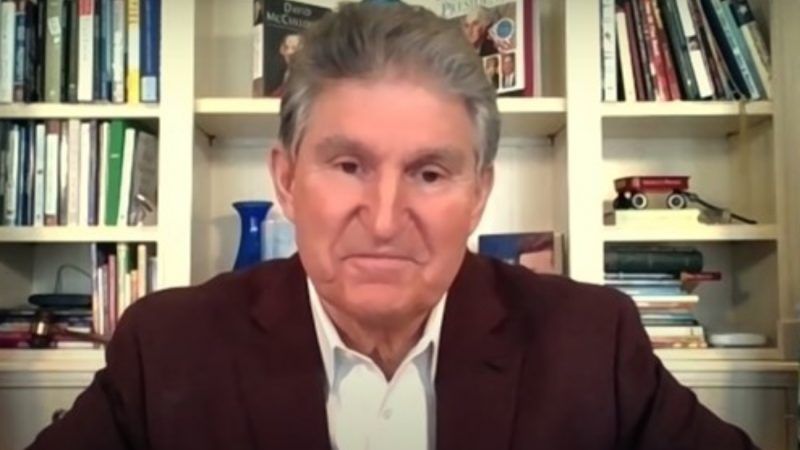Should Ted Cruz and Josh Hawley Be Expelled From the Senate for 'Insurrection'?
That punishment for reinforcing the delusions that drove the Capitol riot is highly unlikely, and it would set a troubling precedent.

During a recent interview about the fallout from the Capitol riot on Firing Line with Margaret Hoover, Sen. Joe Manchin (D–W. Va.) brought up Section 3 of the 14th Amendment, which bars senators and representatives from serving in Congress if they "have engaged in insurrection or rebellion." Based on that provision, Hoover asked, would Manchin support the "removal" of Sens. Ted Cruz (R–Texas) and Josh Hawley (R–Mo.), who pressed their objections to President Joe Biden's electoral votes even after that cause had led to a violent invasion of their own workplace?
Given that Manchin is widely considered the most conservative Democrat in the Senate and has expressed concern about the divisiveness of rushing to impeach and try former President Donald Trump for his role in the riot, his response was striking. "That should be a consideration," he said. "Ted's a very bright young individual, and I get along fine with Ted. But what he did was totally outside of the realm of our responsibilities or our privileges that we have." Other senators, including Sheldon Whitehouse (D–R.I.) and Sherrod Brown (D–Ohio), have said Cruz and Hawley should be expelled if they refuse to resign.
Expelling Cruz and Hawley, like convicting Trump, would require approval by two-thirds of the Senate, meaning 17 Republicans would have to agree that their conduct disqualified them from continuing to serve in Congress. That seems quite unlikely. But even entertaining the possibility raises troubling questions about the consequences of defining insurrection to include public officials who allegedly helped inspire it.
Section 3 was originally aimed at former Confederates, who inarguably engaged in "insurrection or rebellion." It is not much of a stretch to say that the people who participated in the deadly attack on the Capitol, which was aimed at preventing a duly elected president from taking office, did something similar.
But the article of impeachment against Trump that the House approved a week later argues that he also engaged in insurrection, because he fired up the rioters with his oft-repeated fantasy of a stolen election. "Do you agree that President Trump incited an insurrection?" Hoover asked Manchin, who replied that there is "no doubt at all in my mind."
If you accept that premise, it logically follows that politicians like Cruz and Hawley, who reinforced Trump's fantasy by challenging electoral votes without any basis to believe they were not "regularly given" or "lawfully certified" (as required by the Electoral Count Act), are insurrectionists too: They "engaged in insurrection" by promoting false beliefs about the election, which in turn inspired violence by some Trump supporters. That seems like quite a stretch. Under this interpretation, any legislator who lent credence to Trump's outlandish claims of massive election fraud—which would include most Republicans in the House—should be expelled under Section 3.
Even Trump's most vociferous critics should think long and hard before opening that can of worms. The implication is that legislators who support a cause that moves some people to anti-government violence thereby forfeit their right to serve in Congress. It is not hard to imagine how that logic might be applied to left-leaning legislators who, say, vehemently criticize police practices and passionately decry racial bias in law enforcement.
None of this means that senators like Cruz and Hawley, or representatives such as Mo Brooks (R–Ala.), did nothing wrong when they persistently fed the twin delusions underlying the Capitol riot: that Trump won the election and that Biden's inauguration could still be prevented. Cruz and Hawley sacrificed truth and their supposed constitutional principles for political gain, hoping to enhance their status as presidential contenders by appealing to ardent Trump supporters. Their actions were reckless, cynical, and legally groundless. Although they claimed to be upholding the integrity of the election system, they were attacking its constitutional foundation by trying to override electoral votes that were duly certified by the state officials who are legally charged with that responsibility.
Cruz and Hawley violated their oaths to uphold the Constitution for the crassest of reasons. As Hoover noted during her interview with Manchin, Cruz was using his support for overturning the election results to raise money even as he and his colleagues were forced to flee enraged Trump followers. "Totally unconscionable," Manchin said. He wondered "how any of them can live with himself knowing that because of their objections…five people lost their lives."
This sort of disgraceful behavior should not go unpunished. But if Cruz and Hawley are to lose their jobs, the decision should be left to their constituents.
Short of expulsion, the Senate can register its disapproval of what Cruz and Hawley did by censuring them, which requires no more than a simple majority. That approach would avoid setting a dangerous precedent while providing ammunition to the senators' opponents in future elections. If voters see fit to re-elect such cowardly, irresponsible, unprincipled hacks, they will have to live with the consequences, and they will have no one but themselves to blame.


Show Comments (209)